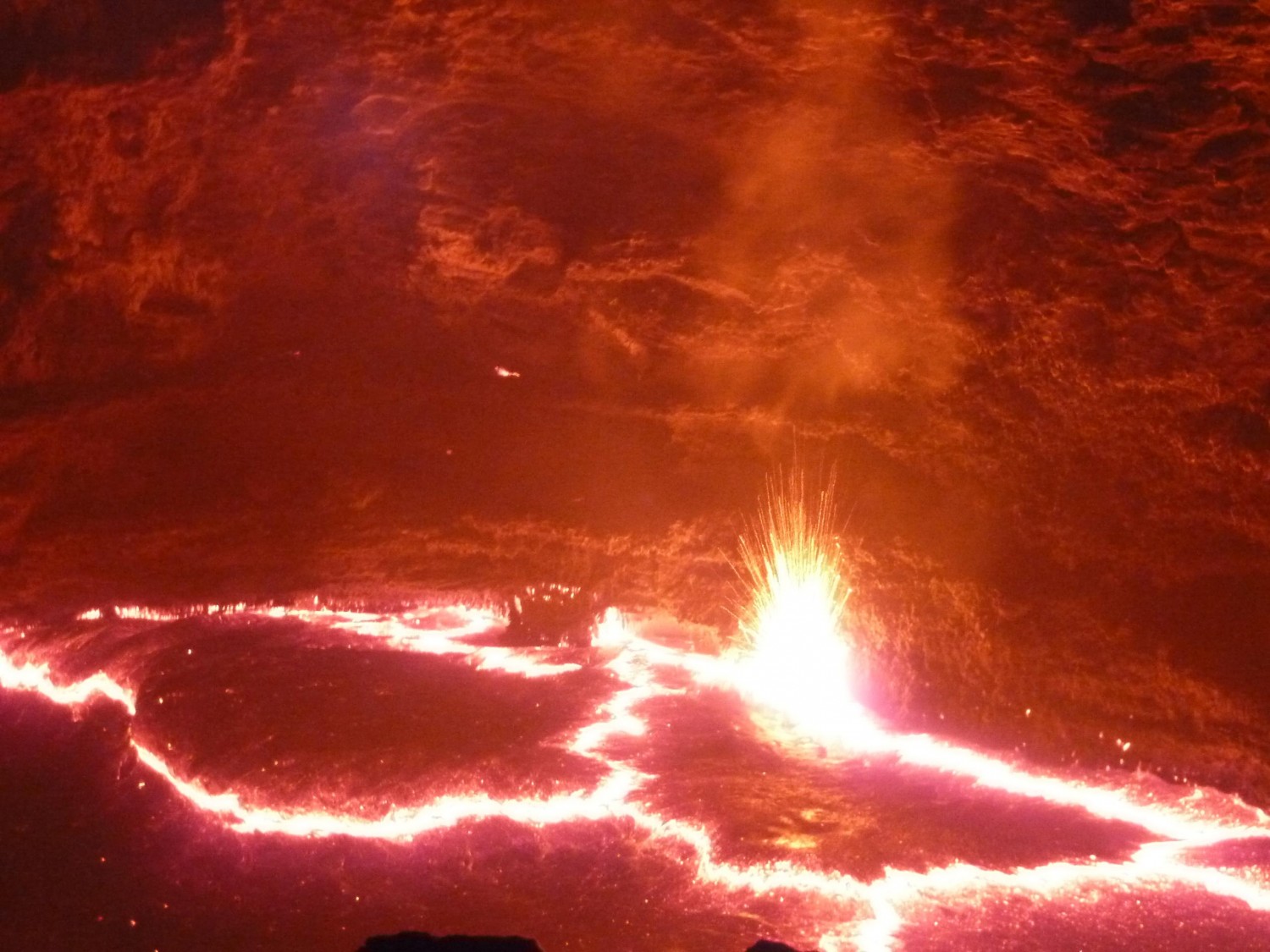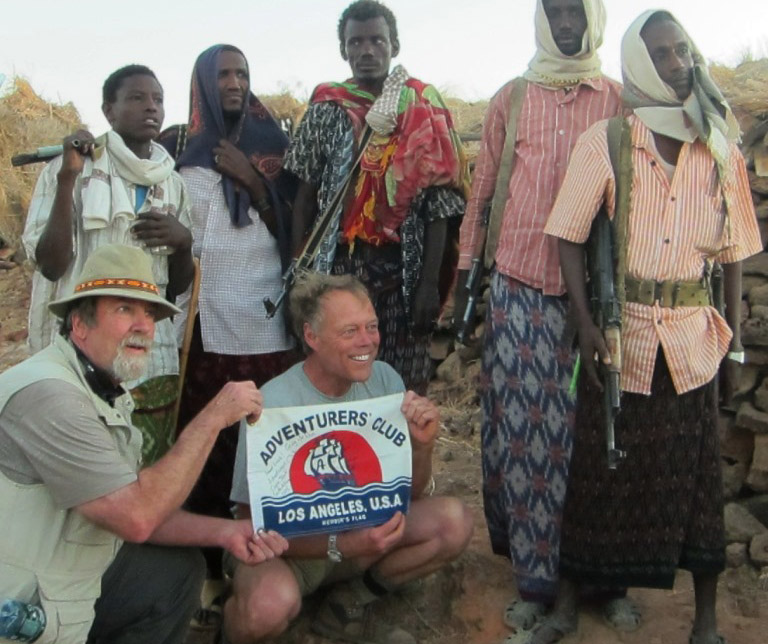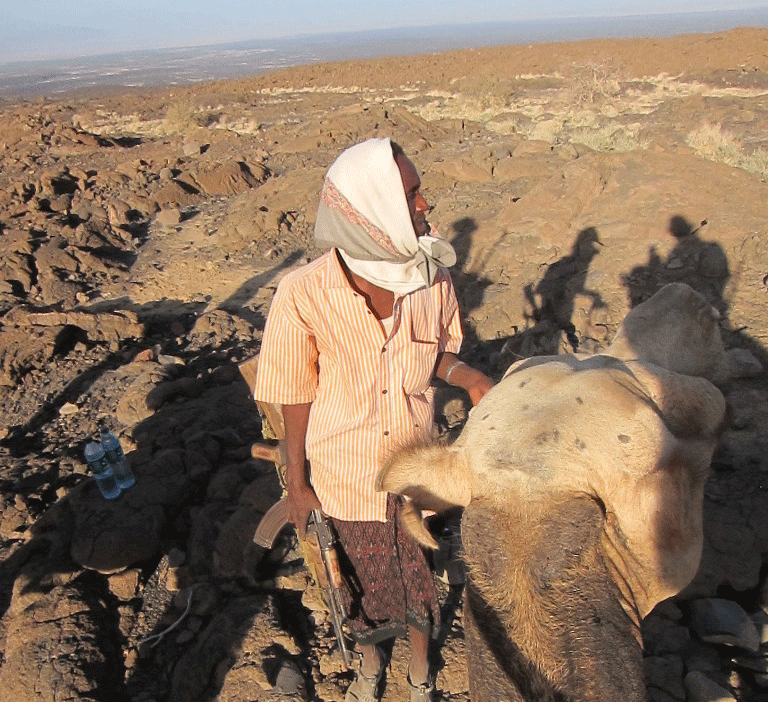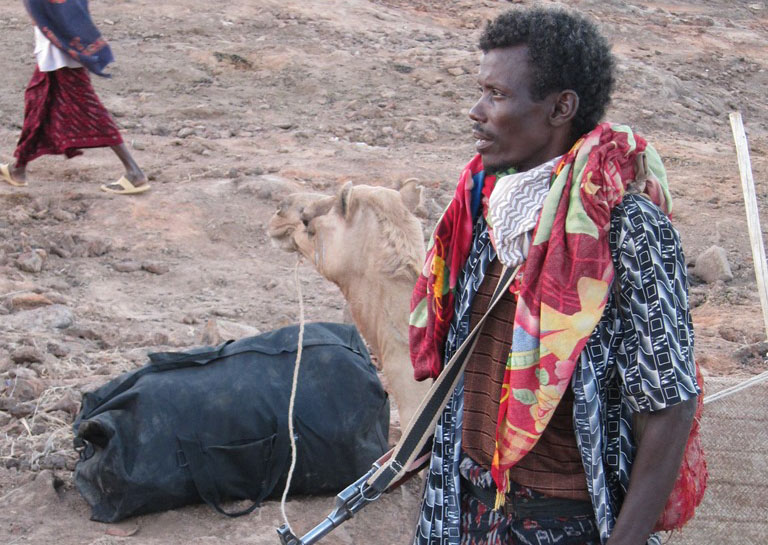
All six gunmen arrived at sunset, bought and paid for, and all we had to do was choose who would go with whom. Moussa was small as Afar tribesmen go and yet, everything about his manner suggested he was a predator. He squatted in the sand, chin to his knees, his opal eyes darting back and forth, missing nothing. Producing a bone-handled blade, he began to sharpen it on a stone next to him, gently, methodically, running it back and forth. As I watched his movements, I remember wondering whether he would protect me or kill me.
I had received the call only two weeks prior from our friend, a volcanologist for NASA at the Jet Propulsion Laboratory in Pasadena. She was going to study a rare shield volcano in the northern Ethiopian desert and wanted me to document it. Three other planetary scientists would join us. My wife, Irene, never one to be left behind, signed on immediately. We were going to the Danakil, home of the Afar.
The Afar are Sunni Muslims and hereditary nomads who number about 1.5 million throughout Eritrea, Ethiopia, Somalia and Djibouti. Their history can be traced back at least to the 13th century when they first appear in the writings of Moroccan historian, Ibn Sa’id. They are sometimes referred to as the Danakil, as they are closely associated with the great desert of the same name. They were introduced to the general public in “Arabian Sands,” an epic travel book by Wilfred Thesiger who crossed their land in 1935, calling them “murderous thugs” among other unmentionable titles. By the mid-20th century there were numerous reports of them castrating trespassers on their land. Scary reputation aside, they were also known for their exceptionally kind treatment of animals, especially their camels that are considered family
members. The African Ass, extinct on the rest of the continent, is protected in their desert and thrives. While they might disembowel a trespasser, they would never intentionally step on a plant or flower.
Their homeland, in the Danakil Depression, is arguably the hottest and most barren wilderness on earth, where they pay homage to local caliphs and recognize no other government. Our destination, the Erta Ale volcano, vents in the center of the depression’s endless salt flats. It is sacred to them in ways not easily understood by outsiders. The Afar stayed pretty much off the international grid until 1998 when Eritrea and Ethiopia fought a war on their land. Since that time they have had almost complete autonomy as a buffer between the two nations. They are singlehandedly credited with keeping Al Qaeda from crossing the Red Sea from Yemen into this part of Africa. All that aside, the Danakil has experienced numerous kidnappings for ransom over the past few decades, the credits for which have been claimed by just as many splinter terrorist groups.
Only a handful of Afar ever assimilated into city life and even fewer make their living by cutting salt blocks from the desert floor and selling them to camel caravans. Only recently the clans that live near the Erta Ale volcano have begun to admit trekkers, realizing this natural inferno can be a cash cow tourist draw. Their reputation aside, as in many cultures with no written language, their word is their bond. It was their word that saved my life.

I did not know until we arrived that NASA had refused funding and logistical support, labeling the journey “too dangerous.” So we were on our own. I considered backing out, but logic came in third after curiosity and adventure. The Afar offered us access to the volcano provided we each hire one of them to act as security.
This is a situation most explorers have to confront at one time or another, to trust a man with a gun who says he will protect you no matter what. It is a roll of the dice and the bet is one’s life. Who knows why we do such things? It seems an inbred human flaw that our curiosity often results in our demise, and yet many of us return to possible danger like moths to a flame. Such questions butt up against the meaning of life itself, a pursuit so far that seems to elude mortal man. I have no death wish but I would prefer to meet it doing what I love rather than lying in a hospital bed wondering why I never chased the dream. And so we went to Ethiopia.
From the capital of Addis Ababa we flew northeast to the city of Mekele. The city was still pocked with craters from Eritrean artillery. Shop windows were covered by hastily nailed plywood boards. Tuk Tuks plied the streets, carrying women wrapped in long shawls with hennaed eyes to shops riddled with bullet holes. The shelves sat mostly empty of goods. The people we passed had the thousand-yard stare of combat veterans. In a surreal encounter, I chanced upon a desert tortoise wandering down the main road, his shell heavily dented, probably from a shrapnel hit. The tortoise seemed an appropriate metaphor for the city itself, slowly moving forward, damaged and recovering.
From Mekele, we drove ten hours deep into the Danakil, past artillery craters, burned-out armored vehicles and towering sand dunes. There is nothing like vast desert to make one realize personal insignificance. Our two small vehicles raised such a cloud of dust, that our presence was announced long before our arrival. In the late afternoon we pulled into the Afar outpost of Dodom, a rambling shantytown of homemade huts populated by sarong-wearing young men with Kalashnikov rifles slung lazily across their shoulders. A handful of women, wrapped in long shawls, eyed us warily from the shadows. Money changed hands; loyalty oaths were exchanged; and we were escorted to stone huts to await our nighttime ascent of the volcano. They said the trek to the summit would take three hours.
It was too hot to sleep or eat, and I could not force down hot water without retching. Our intrepid group lay in a row inside the hut, panting and willing the temperature to fall.
Irene has one good eye and because the trail was razor sharp, stratified magma, she rode a camel while the rest of us went on foot. Our escorts arrived at sunset. I chose Moussa, and we set off.
Moussa’s black hair was a mass of curly ringlets that stuck out like a weed bursting through the ground. His skin was dark, and his arms and legs were sinewy and powerful. Irene mounted her camel and was led off by a gunman as the rest of us fell into single file to negotiate the uneven terrain. There was no moon; it was very hard to see. Our headlamps, bouncing off volcanic boulders, cast dancing shadows like a macabre puppet show. It was still viciously hot and the earth trembled as we walked up the volcano’s flank, a mere 600 feet in altitude gain over six miles, to reach the churning cauldron of the summit lake. The deep indigo sky revealed pinpricks of light as the Milky Way arched over us like a hazy silver rainbow.
The Afar walked noiselessly in plastic sandals and rubber flip-flops. Their bodies carried no fat. Their rifles were extensions of their arms, rarely set down and never out of their reach. Every noise and peripheral movement brought a reaction that only those who live in a war zone can give.
Some had grenades hung from their belts that if exploded near the hardened magma would intensify the shrapnel a hundred-fold. All of them kept a dagger in their belt. Up close, their faces were a mass of scars and more than a few had a milky eye from blowing sand. They were warriors first and foremost, and they were always at war.
The Afar moved like wraiths and within minutes our group was spread out over a vast area of the slope, hidden from each other by massive boulders. I couldn’t see Irene and I questioned the importance of our being there. In the dark blankness, Moussa disappeared for minutes at a time. Then my headlamp would pick him up, squatting on top of a boulder, eyeing me.

My breath came harder with each step, which I chalked up to advancing age and three-plus decades of remote exploration. After two more hours I couldn’t go any further and collapsed, sucking air in great gasps. I assumed it was a heart attack and remember looking up at the stars as the earth rumbled beneath me. I remember thinking it was a beautiful place to die. I don’t remember how long I laid there and I may have passed out. When I came to, I was looking at the barrel of an automatic rifle aimed between my eyes. Moussa was straddling me, poking me with his Kalashnikov. From my haze I vaguely recall saying a prayer for Irene and waiting for Moussa to pull the trigger.
Then he lay down on the ground next to me, rifle under his head, wrapped himself in his robe, and within a minute began snoring louder than the mountain. The absurdity of it all hit, me and I burst out laughing.
I was dying on the side of a convulsing volcano in a remote desert, next to a sleeping nomadic gunman, while my wife rode off into the night on a camel. It would be one of my greatest stories and no one would ever know it happened. It would die with me! I laughed until I was gasping for air, which awakened Moussa. Standing over us was the camel he had brought down from the summit, Irene’s camel. Only then did it hit me that she was safe at the top and that Moussa had come looking for me when I did not show up.
He helped me to my feet, holding me upright, both hands on my shoulders, and held my gaze in his own for several seconds, asking without words if I was ok to continue. I felt no pain but it was hard to breathe and there was no place to go but up. I looked ahead and saw the red glow of the summit, like a dancing aurora, no more than one hundred yards away. I waved off the camel as it would have taken more effort to mount than to walk the final steps.
Together, arm in arm, we walked toward the crest. At the top, we stood at the edge for a few seconds and gazed into the churning stew of liquid earth belching up from far below. Gas bubbles exploded like fireworks, showering burning, liquid confetti in all directions. Under better circumstances it would have been the lightshow of a lifetime. Irene found me in the dark and Moussa directed both of us into a grass hut. I drifted off to sleep wondering why anyone would build a grass hut at the edge of a live volcano.
It seemed only minutes later that Moussa prodded me again with his rifle, and I heard our party yelling to pack up fast. Dawn was just beginning to break when a gunshot ended the night. I was still in a daze and not thinking rationally when Moussa waved us down the trail, and Irene led me away on foot. Within a hundred yards two more shots rang out. This time we heard the zing as the bullets passed overhead and we dove for cover.
When you are being shot at, you do not think. It takes a second for the whine of the bullet to register. Once it does, the only instinct is to merge with the ground, become part of it.
Moussa yelled and frantically waved us downhill while aiming his rifle uphill. As Irene stood up, she immediately fell over. At first I thought she had been hit, but her foot had lodged in a rock crevice and twisted her ankle so severely she could not stand. In an instant Moussa was there with the camel and together we pushed her onto its back with no saddle, smacked it hard on the butt and sent her careening down the trail away from the gunfire.

I descended as fast as I could with Moussa at my side, my breath coming in short gasps. Every few seconds he whirled backwards and leveled his rifle to fire, but there was no more shooting and after a while he seemed to relax. I had no way of asking him what had happened and doubt that he would have told me if he could. Perhaps the Afar were simply letting off steam, or having fun at our expense, or just maybe, one or two hotheads decided that killing us was preferable to guiding us.
The next few hours are a dream-like memory. I mechanically put one foot in front of the other. There was no sense of movement over the vast desolation, it was just too immense. It was still hard to breathe, like when someone has punched you in the stomach, but I was alive and in no pain so I focused on that.
Five hours later I collapsed again in a hut back at Dodom. My electrolytes were depleted and my body involuntarily cramped into a fetal position. Irene, sure that I was dying, forced dry Gatorade down my throat that revived me enough to stand, then helped me to the Rover. In my haze, I was looking for Moussa to thank him and offer him more money when the other Afar started yelling. I heard magazines being slammed into rifle breaches and was pushed into the Rover. We took off with tires spinning, sending a rooster tail of sand into the air.
I never found out who fired those shots, and I never saw Moussa again. My gunmen proved to be a guardian angel and his face has haunted my dreams ever since. Many times I have awakened at night, gasping for air while staring into a rifle barrel. If ever a debt was left unpaid, it is mine to this man. All I can do now is pay it forward in the future.
Returning home we found that Irene had a fractured fibula and she spent a month in a walking boot. I had multiple blood clots in both legs and lungs that accounted for my faux heart attack. Three different doctors told me I should have died on the volcano. It took me a year to recover. In the end, the scientists got their data and I got a great story.
A few months later, nine trekkers were awakened from a sound sleep inside the same grass huts on the summit of Erta Ale. According to the BBC, they were manhandled outside where five of them; German, Hungarian and Austrian, were lined up and executed with AK47 Kalashnikov automatic rifles. The other four disappeared into the desert.
The Afar Revolutionary Democratic Front Militia claimed responsibility, the same tribal faction that Moussa was from.
James Michael Dorsey’s story “To Live or Die in the Danakil” is the winner of the 2015 Nowhere Spring Writing Contest. Dorsey is an author, explorer and lecturer who has traveled extensively in forty-five countries. He has spent the past two decades researching remote cultures around the world.His latest book Vanishing Tales from Ancient Trails, is a collection of his stories and essays from these travels.
